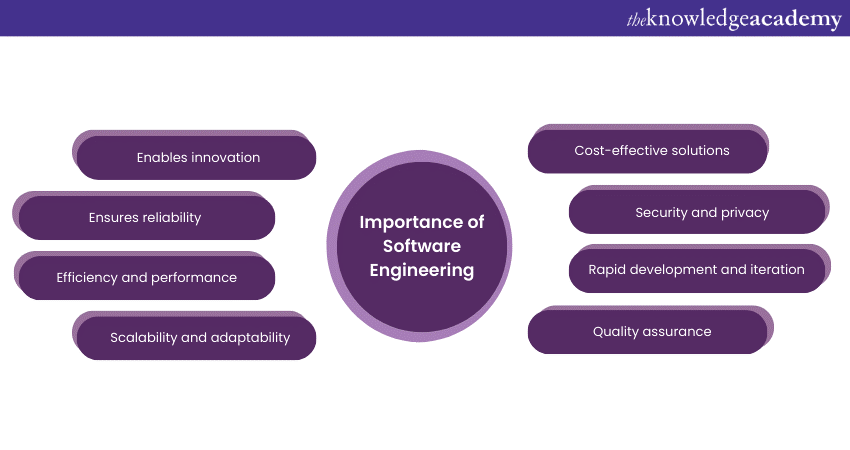We may not have the course you’re looking for. If you enquire or give us a call on +44 1344 203999 and speak to our training experts, we may still be able to help with your training requirements.
Training Outcomes Within Your Budget!
We ensure quality, budget-alignment, and timely delivery by our expert instructors.

In the rapidly advancing modern world, technology has become an integral part of our daily lives, and the importance of Software Engineering extends far beyond the confines of big IT companies and multinational corporations. Software Engineering, at its core, is the methodical and systematic approach to creating, designing, and developing software for computer systems and various electronic devices. It serves as the backbone of the digital age, underpinning our interactions, work, and leisure activities.
If you are someone who is curious to gain knowledge about the Importance of Software Engineering, you have landed in the right place. Read this blog to explore the critical role of Software Engineering and why it is essential for creating reliable, efficient, and innovative software applications.
Table of contents
1) What is Software Engineering?
2) Importance of Software Engineering
3) Importance of Software Engineering in Computer Science
4) Importance of Software Engineering in Information Technology
5) Future of Software Engineering
6) Conclusion
What is Software Engineering?
Software Engineering is the process of systematically designing, developing and maintaining software. It involves understanding and documenting the software's requirements, creating a design and architecture, writing the code, and ensuring the software's quality through testing and quality assurance. Software Engineering aims to produce reliable, efficient, and scalable software systems.
Ready to build a future in Software Engineering? Join our Software Engineering Courses and kickstart your career in technology today!
Importance of Software Engineering

The Importance of Software Engineering is significant in today's digital age for several reasons:
1) Enables innovation: Software Engineering is at the heart of innovation in technology. It allows us to create new applications, products, and services that drive progress and improve our lives.
2) Ensures reliability: Proper Software Engineering practices lead to more reliable and stable software, reducing the likelihood of crashes, errors, and system failures. This is crucial for critical applications in healthcare, transportation, and finance.
3) Efficiency and performance: Well-engineered software is optimised for efficiency and performance. It can handle tasks faster, consume fewer resources, and deliver a better user experience.
4) Scalability and adaptability: Software Engineering principles facilitate the development of scalable software that can grow with increasing demands. It also allows for easy adaptation to changing requirements and technologies.
5) Cost-effective solutions: Investing in Software Engineering upfront can lead to cost savings in the long run. Properly designed and maintained software requires fewer resources for maintenance and support.
6) Security and privacy: Software Engineering practices include security considerations, helping to protect data and systems from cyber threats. This is particularly crucial in an era of increasing digital vulnerabilities.
7) Rapid development and iteration: Modern Software Engineering methodologies, such as Agile and DevOps, enable rapid development and iterative improvements, ensuring that software can keep up with evolving user needs.
8) Quality assurance: Software Engineering incorporates quality assurance processes and testing to identify and address defects, ensuring that the final product meets high standards.
Importance of Software Engineering in Computer Science
Software Engineering plays a crucial role in the field of Computer Science, and its importance is evident in several ways
1) Structured development: Software Engineering provides a structured and systematic approach to developing software. This methodology is essential for ensuring that software projects are well-organised, follow best practices, and are completed efficiently.
2) Quality assurance: Software Engineering emphasises quality assurance through rigorous testing and validation processes. This ensures that software is reliable, robust, and free from critical defects.
3) Efficiency: It promotes the efficient use of resources, both in terms of the development process and the software's runtime performance. This efficiency is critical for resource-constrained devices and applications.
4) Scalability: Software Engineering principles enable the development of scalable software, which can grow to meet increasing demands. This is especially important in the context of large-scale applications and systems.
5) Maintainability: Well-engineered software is easier to maintain and extend over time. This reduces the cost and effort required for ongoing software maintenance and updates.
6) Consistency and standardisation: Software Engineering enforces coding standards and best practices, promoting consistency and making it easier for different developers to work on the same project.
7) Risk management: It incorporates risk management processes to analyse and address potential issues early in the development cycle, reducing the likelihood of project failures.
8) Interdisciplinary integration: Software Engineering often involves collaboration with other fields, such as hardware engineering, to ensure seamless integration of software with various systems and components.
9) Security: Security is a fundamental aspect of Software Engineering. It emphasises the identification and mitigation of security vulnerabilities, protecting software from cyber threats.
Unlock your potential in software development! Register for our Software Development Lifecycle Training today!
Importance of Software Engineering in Information Technology
Software Engineering is of paramount importance in the field of Information Technology (IT) for several reasons.
1) Efficient systems: IT relies heavily on software to manage and process vast amounts of data. Software Engineering ensures that IT systems are efficient, allowing organisations to make the most of their technology investments.
2) Customisation: Many IT solutions are tailored to the specific needs of organisations. Software Engineering enables the development of custom software applications that meet these unique requirements.
3) System integration: IT environments often consist of various hardware and software components. Software Engineering helps in the seamless integration of these components, ensuring they work together harmoniously.
4) Automation: IT systems depend on automation for tasks like data processing, backups, and security monitoring. Software Engineering facilitates the development of automation scripts and tools, increasing operational efficiency.
5) Data security: Protecting sensitive data is a top priority in IT. Software Engineering practices include security measures to safeguard data against breaches, ensuring compliance with privacy regulations.
6) Cloud computing: IT's shift toward cloud-based solutions relies heavily on Software Engineering for the development of cloud-native applications and services.
7) Agile development: Agile methodologies are often used in IT to respond to changing business needs as fast as possible. Software Engineering methodologies like Agile and DevOps help in rapid software development and continuous improvement.
8) Maintenance and updates: IT systems require continuous maintenance and updates. Software Engineering principles make these tasks more manageable, reducing downtime and disruptions.
9) Disaster recovery: IT systems need to be resilient to unforeseen events. Software Engineering contributes to disaster recovery planning and the development of backup and restore mechanisms.
Elevate your software design and architecture skills! Join our Software Design and Architecture Training now!
Future of Software Engineering
The future of Software Engineering is an exciting and rapidly evolving landscape. Several trends and developments are shaping the direction of the field. Here are some key aspects of the future of Software Engineering.
1) Artificial Intelligence (AI) and Machine Learning (ML): AI and ML are becoming integral to Software Engineering. They are used to automate tasks, enhance decision-making, and improve software's adaptability and performance.
2) Quantum computing: Quantum computing can revolutionise Software Engineering by solving complex problems exponentially faster. This will impact fields like cryptography, optimisation, and scientific simulations.
3) Low-code and no-code development: These approaches enable individuals with limited programming knowledge to create applications. They will democratise software development, making it more accessible to a broader audience.
4) DevOps and Continuous Integration/Continuous Deployment (CI/CD): DevOps practices, combined with CI/CD pipelines, will continue to streamline the software development process, enabling rapid releases and updates.
5) Microservices architecture: Microservices are modular, independently deployable components that will become more prevalent. They offer scalability and easier maintenance, making them attractive for complex applications.
6) Blockchain technology: Beyond cryptocurrencies, Blockchain has applications in various industries, and software engineers will be needed to create blockchain-based solutions.
7) Internet of Things (IoT): As Internet of Things (IoT) devices become more widespread, software engineers will play a crucial role in developing applications to manage and utilise the data generated by these devices.
Conclusion
Software Engineering is a dynamic and indispensable discipline that shapes the way we interact with technology and the world around us. In this blog, we've explored the Importance of Software Engineering in various fields, including Computer Science, Information Technology (IT), and many industries. The future of Software Engineering is brimming with promise and innovation. Emerging technologies like Artifical Intelligence (AI), quantum computing, and blockchain are poised to transform the way we design, develop, and utilise software.
Begin your journey in Java programming and Software Engineering with our Java Programming and Software Engineering Fundamentals Training now!







 Top Rated Course
Top Rated Course




 If you wish to make any changes to your course, please
If you wish to make any changes to your course, please


